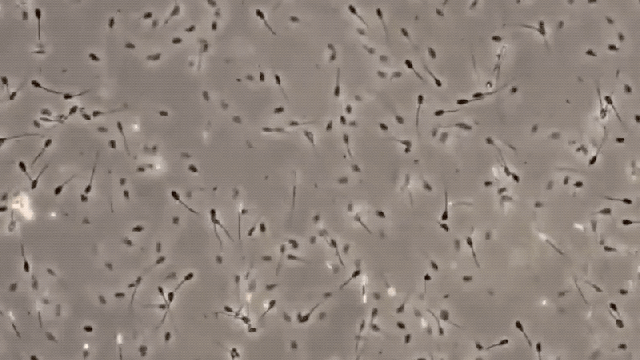Semen frozen back in 1968 has been used to impregnate dozens of Merino ewes, resulting in healthy lambs. The Australian scientists who made it happen say it’s the oldest sperm ever used to produce offspring.
A research team led by Simon de Graaf from the Sydney Institute of Agriculture and School of Life and Environmental Sciences impregnated 34 Merino ewes with the thawed out 50-year-old ram sperm, according to a University of Sydney press release. Incredibly, the sperm resulted in birth rates comparable to semen frozen for 12 months.
The original semen was donated by the Walker family, which currently maintains some 8,000 sheep at Yass Plains in New South Wales, Australia. In 1968, veterinary scientist Steven Salamon froze pellets of the Merino sheep sperm using liquid nitrogen, which he did to test the long-term viability of semen cryopreservation.
This latest experiment suggests sperm can remain frozen for at least 50 years to no discernible ill effect. The news bodes well for not just veterinary scientists, but also individuals at risk of losing their fertility, such as males undergoing chemotherapy for cancer. As de Graaf told Inverse, “What is true for the sheep is also true for humans.”
This news is also important for geneticists seeking to understand how artificial selection has altered the DNA of livestock. In this case, the newly produced lambs displayed body wrinkles characteristic of Merinos at the middle of the 20th century — a feature originally bred into the species to maximise skin surface area and, as a result, increase wool yields. This version of the Merino sheep is now largely gone, because the folds created problems such as difficulties in shearing and increased risk of fly strike, a type of parasitic disease, the researchers explained.
The newly produced lambs thus provide an unprecedented look into genetic history, and a potential baseline should we ever wish to revert these animals back to a certain former glory. Breeders of purebred dogs should take notice of this research, as genetic diversity in many breeds is narrowing to dangerous levels.
Jessica Rickard, who collaborated with de Graaf in the experiment, tested the sperm after thawing, assessing the quality of the sperm in terms of mobility, speed, viability, and DNA integrity. She detected no differences in the 50-year-old sperm compared to sperm that had been frozen for a year. The sperm was then used to impregnate 34 out of 56 ewes — a fertility rate comparable with sperm frozen for 12 months. All semen used in the study came from four rams, including Sir Freddie, who was born in 1959, two rams born in 1963, and a ram born in 1965.
As noted, there’s no reason to believe human sperm will act any differently than sheep sperm, but the researchers will have to keep an eye on those new lambs to make sure they develop normally.
It’s now reasonable to wonder how long semen can be stored at liquid nitrogen temperatures before it starts to degrade, but these latest results are quite encouraging. For human males, this raises the possibility of having biological offspring at extreme ages — or even long after death.
